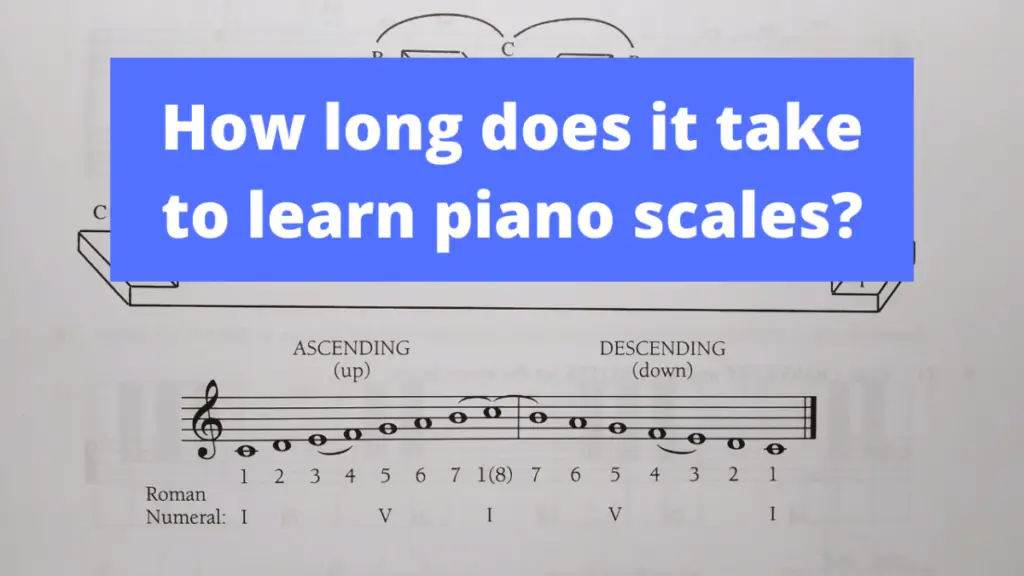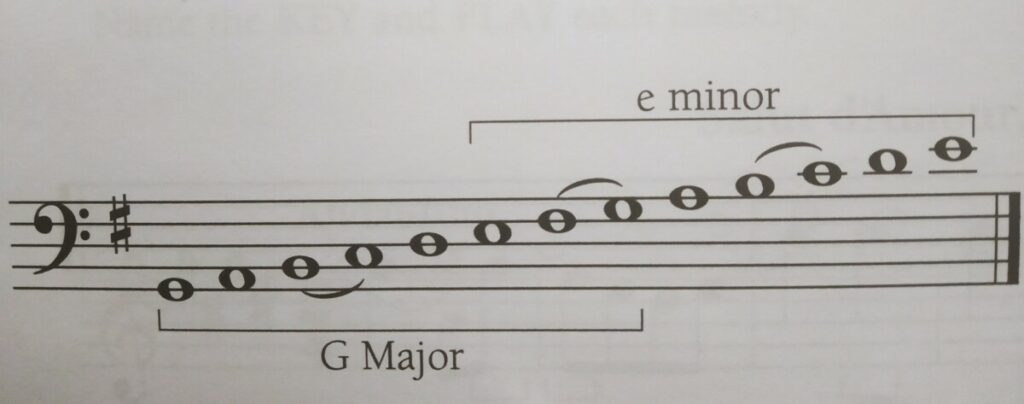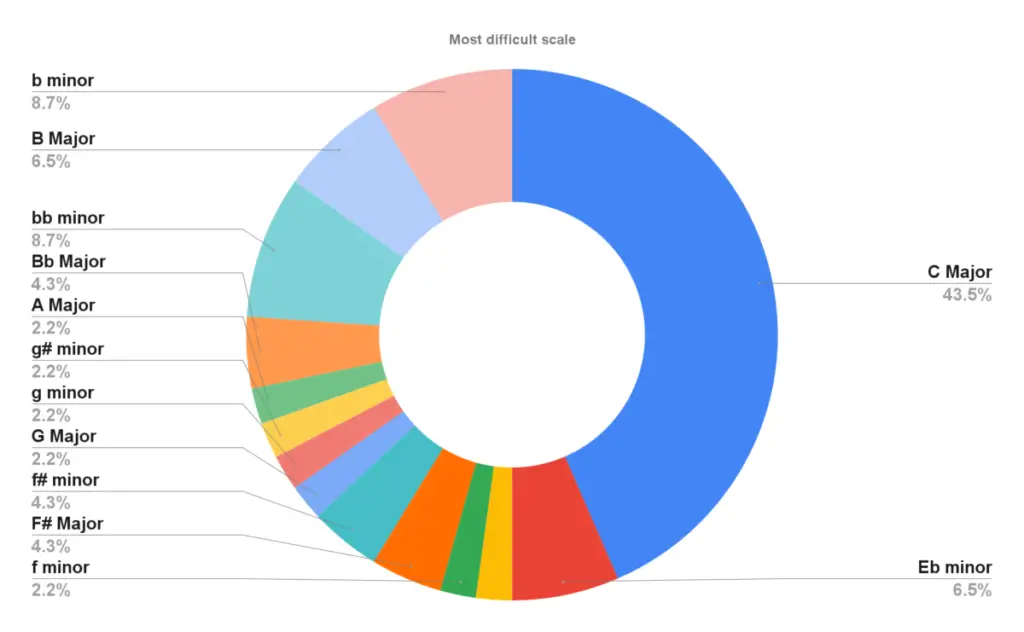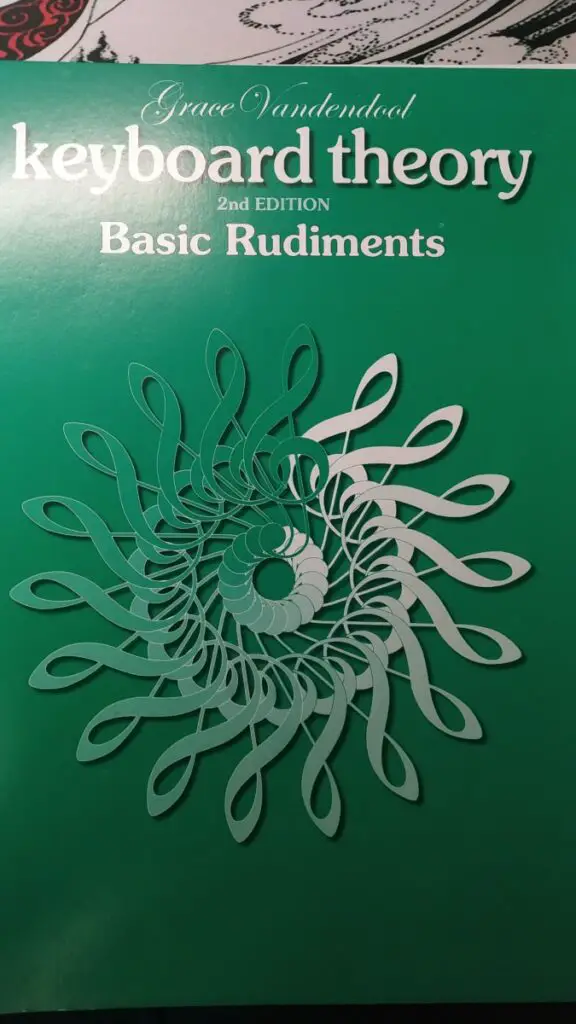This post contains affiliate links.

You want to learn piano scales but aren’t sure how long it would take to learn all scales or how much time you should spend learning each scale.
It takes 30 minutes to learn to play one piano scale in one octave with both hands at a slow tempo. However, it’ll take at least a week of practice to be able to play one scale comfortably in two octaves. There are 48 piano scales and it will take at least 24 weeks to learn them all.
In this article, I’ll talk about all scales you need to learn for the piano and roughly how long it’ll take to learn them all, as well as some factors that affect how quickly you can learn piano scales. I also have some tips that can help you learn scales quickly.
How long does it take to learn all piano scales?
There are 12 Major scales in total, each with a natural minor scale. The natural minor scale starts on the sixth note of the Major scale and has the same sharps and flats as the respective Major scale.

Aside from the natural minor scale, there is also the harmonic minor scale which is the natural minor scale, but you raise the seventh note by a half-step. There’s also the melodic minor scale, which is the natural minor scale but you raise the sixth and seventh notes of the minor scale by a half-step. A half-step is the distance from a white key to the black key right next to it.
So in total, there are 48 scales you need to learn. But because in harmonic and melodic minor scales, you only need to slightly shift your fingers to play the notes a half-step up, they aren’t much more complicated than the natural minor scales and won’t take a lot of time to learn if you’re comfortable at playing the natural minor scales.
In reality, most of the time will be spent learning 12 Major scales and 12 natural minor scales. In my experience, you need at least a week to learn and comfortably play a scale in two octaves.
Try to learn more than one scale in a week, and you might be confused and accidentally mix up the different fingerings of the scales since you haven’t memorized the scales well enough yet.
Thus in total, you need at least 24 weeks to learn and play all 48 scales – major and minor comfortably. Other factors affect how quickly you learn the scales.
Seeing that it takes at least 6 months to learn all scales, you may wonder if it’s even necessary to learn every single one of them. Read the answer in Must You Learn Every Single Scale?
Factors that determine how quickly you learn piano scales
How much time can you spend practicing the piano?
As they say, practice makes perfect – the more time you can spend practicing scales, the quicker you’ll memorize them and move on to learn new scales.
But let’s be honest, practicing scales is boring. Having to play the same scales over and over again every day is not a fun hobby. However, you must continue practicing scales as scales are the backbone of music theory for the piano and many other instruments. If you understand scales, you’ll have an easier time learning the piano.
I wrote more about the benefits of learning piano scales in this article: Can You Learn Piano Without Knowing Scales (and why you should learn scales anyway)
I find that creating a routine can make practicing scales more bearable. Create a routine where you spend the first 10-15 minutes of your practice session going through the scales you already learned. Before long, practicing scales will become second nature, and you won’t find them as boring as before.
Scales that have the same fingerings
Many scales have the same fingerings despite having different sharps or flats. So if you can play one of them, you will find it easier and spend less time learning the others.
For example, C Major, A Major, and D Major scales all have the same fingerings despite C Major having no sharps or flats, A Major having 3 sharps, and D Major having 2 sharps.
Here are 2 videos showing the same fingerings for A Major and D Major scales:
Some scales are trickier than other
There are scales like C Major that have all-white keys, making it easy to memorize. While other scales like B Major have 5 sharps, meaning you have to spend more time practicing to memorize which 5 sharps are in the scale.
However, in terms of playing the scales on the piano, having more black keys in the scale doesn’t necessarily make it harder to play. The opposite is true: having black keys can guide your fingers and make it easier to play the scale, meaning you spend less time learning it.
For example, try playing the A Major and C Major scales on your piano. You may find that playing the A Major scale feels easier and more natural compared to the C Major scale, despite C Major having no black keys and both scales having the same fingerings.
This is thanks to the black keys present in A Major scale guiding your fingers through the scale. while the fingerings are more awkward for the C Major scale.
Fun fact: in a poll where 46 people voted for which scale is the most difficult to play out of the 12 Major and 12 minor keys, the C Major scale was voted the most!

How is this possible, knowing that the C Major scale has no sharps or flats? It’s because the C Major scale has no black keys to guide our fingers or let us know where we are in the scale, making it more difficult to play compared to other scales
Playing two octaves or contrary motion
Naturally, it’ll take more time to be able to play a scale in 2 octaves with both hands compared to just one. But the benefit is once you can play two octaves, you can play that scale for the whole length of the keyboard.
Once you can play a scale with 2 hands in a parallel motion (both hands going up or down the scale), you can try doing a contrary motion where your right hand goes up the scale while your left hand goes down the scale and vice versa.
I find doing contrary motion doesn’t take much more time once I can play in parallel motion. Also playing scales in contrary motion is a fun exercise.
Play scales at a fast tempo
Playing a scale at a fast tempo is harder and takes more time to pull off compared to a slow tempo. Ideally, you should be able to play a scale at 120 BPM.
If you can play a scale at this BPM with no mistakes, then you’re fluent at the scale and can move on to learn a new one.
Some people are more gifted than others
Tips for learning piano scales quickly
Learn music theory to know and identify the key signature of each scale. This will help you quickly and easily name all the sharps or flats in a piano scale without relying on muscle memory from practicing, especially as you learn more scales where you can accidentally mix them up.
There are many music theory books out there, but I recommend Grace Vandendool’s Keyboard Theory Basic Rudiments. This is a comprehensive book that I used to learn music theory and will teach you all the basics of music theory
It has chapters on key signatures, major and minor scales as well as tricks to easily memorize different scales.
You can get this book here on Amazon (affiliate link).

When practicing scales, practice each hand separately first at a slow tempo until you can do them comfortably, then combine them and play at the same time. Playing scales with both hands is much harder than playing with one hand so get good at playing with one hand first.
Once you can play scales with both hands, you can raise the tempo or try to play contrary motions to get even better at the scale.
When learning scales, learn the Major scale first, then its natural minor scale since they both have the same key signature. After that, learn the harmonic and melodic minor scales. Repeat this for every new major key you learn. This makes sure you learn scales at the fastest pace.
Finally, as you learn new scales, don’t forget to practice old scales. It’s easy to forget the fingerings of old scales as your brain registers the fingerings of new scales you’re learning. So practice old scales so you won’t waste time re-learning them in the future.
You may also want to read
You now know how long it takes to learn one scale, but how long should you spend practicing scales every day? How many scales should you practice every day? How fast should you be able to play piano scales? I answered these questions in the article How Many Piano Scales Should You Practice Every Day?

